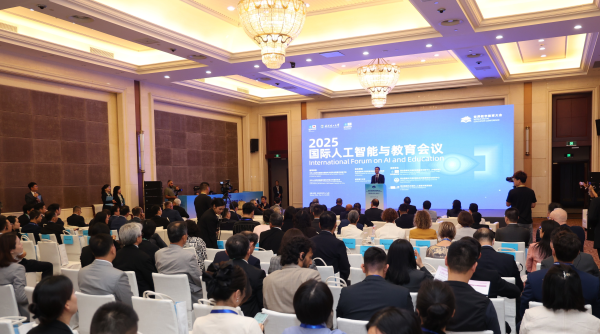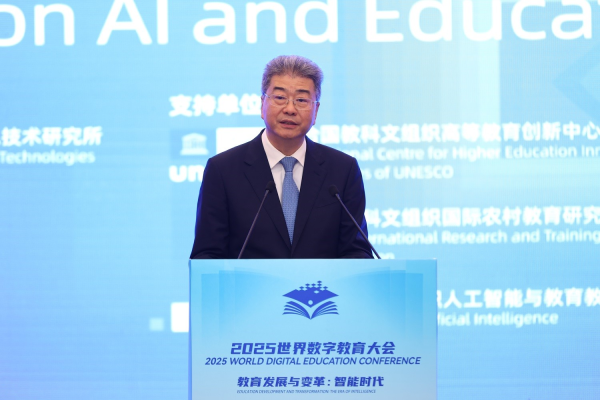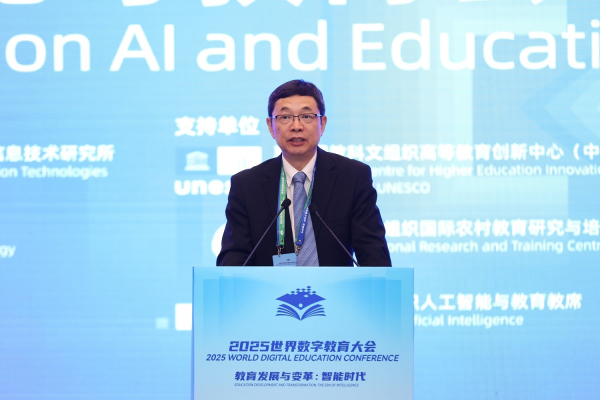
On the afternoon of May 15, the parallel session “International Forum on AI and Education” of the 2025 World Digital Education Conference, co-organized by the UNESCO Institute for Information Technologies in Education and WUT, was held in Wuhan. The event brought together over 200 participants, including ministerial-level officials from nine countries such as Cambodia, Colombia, and Vanuatu, as well as representatives from provincial education administrations, universities, and enterprises across China. Qin Changwei, Secretary-General of the Chinese National Commission for UNESCO, presided over the conference.

Wu Yan, Vice Minister of Education of China; Samdech Hang Chuon Naron, Deputy Prime Minister of Cambodia; José Daniel Rojas Medellín, Minister of Education of Colombia; Jiang Dailan, Vice Minister of Higher Education and Technology of Indonesia; Ulugbek Tashkenbayev, Advisor to the Minister of Preschool and School Education of Uzbekistan; Howard Aru, First Political Advisor to the Minister of Education of Vanuatu; and Yang Zongkai, President of WUT, attended and delivered speeches. Stefania Giannini, Assistant Director-General for Education at UNESCO, addressed the conference via video.

Wu Yan emphasized China’s commitment to leveraging AI to empower educational transformation. He highlighted the implementation of the national educational digitalization strategic initiative to deepen the integration of AI and education, enhancing high-quality educational development. The world’s largest smart education platform has been developed, to be upgraded with intelligent technologies. Wu proposed four collaborative initiatives to promote AI-driven educational innovation: first, collaboratively explore new pathways for the integrated development of AI and education and seek new educational models and forms; second, jointly promote AI education, share high-quality educational resources, and help students master higher-order thinking and innovative capabilities; third, cooperatively advance teacher capacity building to assist educators in acquiring new teaching skills for the intelligent era; fourth, work together to formulate standards and ethical norms to ensure safer, more controllable, inclusive, and equitable technological applications.

Yang Zongkai noted that WUT had long been committed to exploring innovative practices in integrating AI with industry-focused education, deeply embedding artificial intelligence into talent cultivation, scientific research, and social services to form a “three in one” innovation ecosystem. Facing the profound changes brought by the integration of AI and education, the university will build a “discipline + technology + industry” multi-collaborative platform, commit to establishing a new win-win cooperation mechanism through “co-construction, co-appreciation, and co-sharing,” uphold the philosophy of open inclusivity, promote the concept of "technology serving humanity, education as the foundation," and strive to contribute educational wisdom and technological strength to building a community with a shared future for mankind.
During the conference, Miao Fengchun, Head of Future AI Education at UNESCO’s Department for Future Education and Innovation; Zhou Dawang, Director-General of the Department of Science, Technology, and Informatization at the Ministry of Education; and Wang Fazhou, Vice President of WUT, each delivered keynote speeches. Discussions were chaired by Zhan Tao, Director of the UNESCO Institute for Information Technologies in Education; Zhou Zuoyu, Director of UNESCO’s International Research and Training Centre for Rural Education; and Jin Li, Director of the UNESCO-affiliated International Centre for Higher Education Innovation and Vice President of Southern University of Science and Technology.
Participants engaged in in-depth discussions on topics including “AI Reshaping the Global Educational Landscape”, “Competency Demands in the Intelligent Era”, and “Building a Shared Policy Vision for Global Educational Transformation”.
Reported by: Li Hui, Xie Xiaoqin, Xie Xintian
Rewritten by: Zhou You
Edited by: Wang Jingjing, Li Huihui, Li Tiantian
Source: School of Foreign Languages, Publicity Department of the CPC WUT Committee, International Office of WUT
|
|